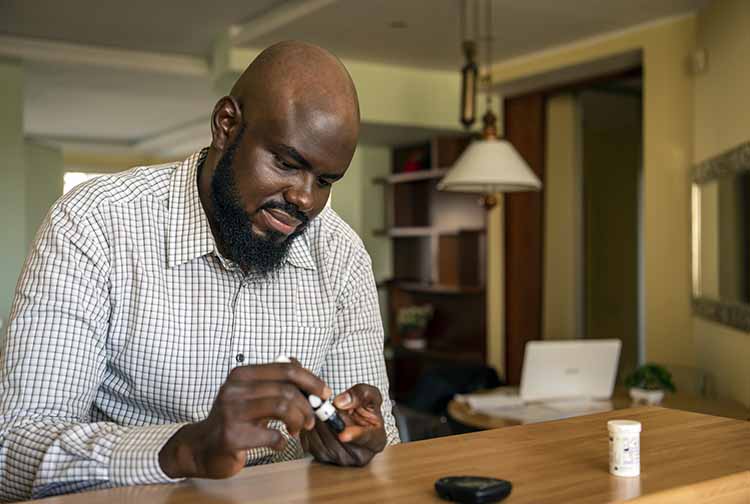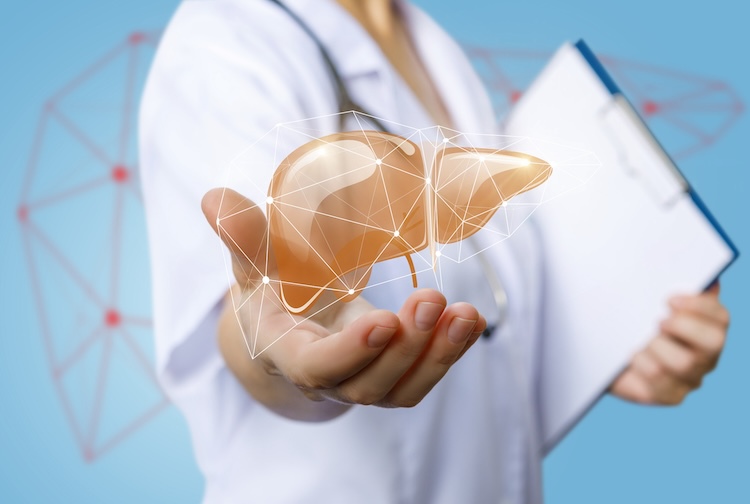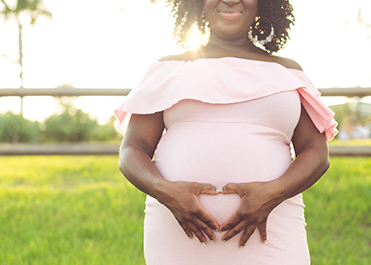
COVID-19 and diabetes: Our expert answers your questions
Dr. Trang Le addresses the impact of COVID-19 on people with diabetes and whether the vaccine is right for you.
January 14, 2022 Photo: Getty Images
Photo: Getty Images
This story was updated to reflect visitation policy changes in 2023. For the most up-to-date information on this topic, please visit the VCU Health COVID-19 page. (Updated July 18, 2023)
If you have diabetes, you’ve probably made several changes to your lifestyle to improve your blood sugar levels and stay healthy. But what about COVID-19? If you get COVID-19, will your diabetes make your treatment more difficult? Will the vaccine impact your insulin or medications?
Here, VCU Health endocrinologist Dr. Trang Le addresses your concerns.
 How dangerous is COVID-19 for people with diabetes? If I have type 1 diabetes, am I at greater risk of severe symptoms, complications or even death if I get COVID-19?
How dangerous is COVID-19 for people with diabetes? If I have type 1 diabetes, am I at greater risk of severe symptoms, complications or even death if I get COVID-19?
There are studies showing that adults with type 1 diabetes who are diagnosed with COVID-19 are at an increased risk of severe COVID-19 illness. Those at greatest risk are people with consistently elevated blood-sugar levels and those with other medical conditions such as obesity or lung, heart or kidney diseases.
How about type 2 diabetes?
People with type 2 diabetes may be at higher risk of more severe illness from COVID-19 than those without the disease. If you have type 2 diabetes, this is an excellent opportunity to work on goals that will not only reduce your risk of COVID-19 severity but will improve your diabetes, weight status and overall health. Pay attention to maintaining healthy blood sugars, see your doctor from home using telemedicine, rather than going into your doctor’s office, focus on healthy meal choices and work some physical activity into your daily routine.
What if I have prediabetes?
There is not much data available specific to COVID-19 and prediabetes, but concerning risks factors still include obesity and other chronic medical conditions — particularly lung, heart or kidney issues.
How about gestational diabetes?
The CDC indicates that pregnant people with COVID-19 might be at increased risk of adverse pregnancy outcomes, such as preterm birth, compared with pregnant people without COVID-19. Gestational diabetes could increase this risk, especially if other chronic health conditions are present.
Is it harder to treat someone with diabetes, if you get COVID-19?
Patients with diabetes and COVID-19 may experience changes in their blood sugars and medication requirements and benefit from more frequent monitoring of their blood glucose values. Patients may experience higher blood sugars with infections in general, and this certainly applies to COVID-19 as well, so close contact with your health care team is needed to make sure you receive the appropriate treatments or insulin doses.
As someone with diabetes, is there anything special I need to do before I come in for my appointment?
We ask that you follow standard COVID-19 safety procedures. When you enter the building, be sure to wear your mask, stop for your temperature check, look for the signage in the elevator as to how many people can enter, and wash your hands when you enter the doctor’s office.
Is the COVID-19 vaccine safe and effective for people with diabetes?
Yes. Whether you have type 1 or type 2 diabetes, prediabetes or gestational diabetes, the COVID-19 vaccines are safe. The U.S. Food and Drug Administration approved the vaccines under an emergency use authorization. To be approved, the vaccines must go through a careful trial process with several phases to address safety and effectives. The COVID-19 vaccine trials did just that, and they included thousands of participants.
The COVID-19 vaccines were produced so rapidly not because they were rushed by cutting corners but because scientists have significant prior experience working with other coronaviruses such as SARS (severe acute respiratory syndrome) and MERS (Middle East respiratory syndrome). Research on a COVID-19 vaccine did not start from scratch.
In addition, the U.S. government made vaccine development a priority once the COVID-19 coronavirus took off in the U.S.
But isn’t there a chance I could get COVID-19 from the vaccine? Is it worth the risk?
You can’t get COVID-19 from any of the vaccines. None of the vaccines authorized by the FDA contain the live coronavirus nor do they contain a weakened or dead version of the coronavirus. The vaccines have no coronavirus to pass on to you.
It’s definitely worth getting vaccinated. All of the currently authorized vaccines available in the United States have been highly effective at preventing COVID-19.
Is there a risk of a dangerous interaction with my insulin or other meds? Should I stop taking my insulin or meds before I get vaccinated?
There is no known interaction with the vaccine and diabetes medications, so it is important to continue on your medications and insulin. Some patients with diabetes experience higher blood sugars for 1-7 days or more after the vaccine, so monitor your blood sugars very closely after vaccination. Your health care team can assist with any temporary dose adjustments, as needed.
Can children with diabetes get the vaccine?
Children ages 5 years and up can get the vaccine, and are recommended to do so — especially if they have diabetes. Studies are underway to approve the vaccine for younger children. For more information on children and the COVID-19 vaccine, including booster shots, see Children’s Hospital of Richmond at VCU.
Does my diabetes qualify as an underlying medical condition, moving me ahead of the general public in terms of getting the vaccine?
Diabetes counts as a medical condition. The distribution of vaccine depends on the availability of vaccines in your area. VCU is offering vaccines to current patients and is in process of contacting our patients ages 16 and up with diabetes for vaccination.
What if I’ve already had COVID-19? Do I still need to get the vaccine?
We recommend you get the vaccine. Although rare, reinfection is possible. If you've had symptoms of COVID-19 but were never diagnosed, don't assume you had the disease and are immune. Get the vaccine.
How do I get the vaccine?
You can register for the COVID-19 vaccine through the Virginia Department of Health (VDH). The website provides a list of sites, such as pharmacies and grocery stores, where you can get vaccinated.
If you are a patient at VCU Health, please visit our COVID-19 vaccine page for information on how you can vaccinated here.
I hear some people have an allergic reaction. As someone with diabetes, will I have an increased risk of an allergic reaction?
The risk of an allergic reaction is not increased by having diabetes but depends on your predisposition towards allergic reactions in general.
To contact our diabetes staff or to make an appointment, call VCU Endocrine at (804) 828-2161.
For more information
For a variety of news and information on COVID-19, and how VCU Health is keeping patients safe, please visit our COVID-19 News Center.



